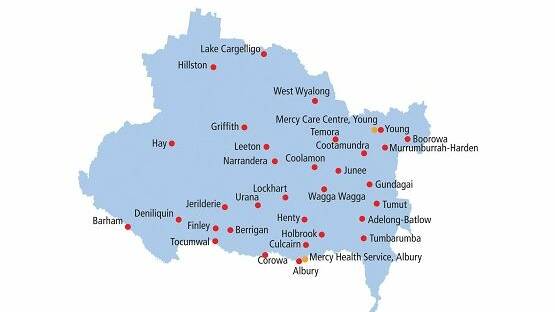
The Cootamundra-Gundagai local government area still has only one coronavirus infection, although a further seven have been diagnosed in the Murrumbidgee Local Health District (MLHD) over the past 24 hours, bringing the total to 20.
Subscribe now for unlimited access.
$0/
(min cost $0)
or signup to continue reading
Of the 21 local government areas (LGAs) within the MLHD Albury City has six infections, Wagga City and Federation four, Griffith City three and Greater Hume two.
All cases notified were diagnosed after travelling overseas or being in contact with a confirmed case.
MLHD did not reveal how many patients were being managed at home or how many had been admitted to hospital.
"Australia has very strong privacy laws which do not allow the release of individual personal and health information to the public," MLHD said in a statement.
"The release of such personal details contradicts public health ethical principles.
"Contact tracing and laboratory testing to identify and isolate cases of COVID-19 are done using standard public health protocols which have proven to be effective here and internationally.
"The release of personal details could increase the likelihood of people not cooperating with contact tracing and laboratory testing to identify and isolate cases of COVID-19.
"This would increase the risk to the community and individuals with the disease with the potential to cause unnecessary community anxiety and bring stigma and harm to affected individuals and their families.
"For these reasons, the Australian Health Protection Principal Committee (AHPPC), which is chaired by the Australian Government Chief Medical Officer and all state and territory Chief Health Officers, does not in any way support the public release of personal information of people found to have COVID-19 or those who may have been close contacts with patients."
MLHD advises that the most common symptoms of COVID-19 are fever, sore throat and dry cough.
Symptoms will generally appear 3-4 days after exposure to the virus but can be up to 14 days later.
Members of the public are advised to minimise travel, increase personal awareness around hand hygiene and practice social distancing.
Anyone who believes they have may have contracted the COVID-19 virus (ie: who are returned travellers, or who have come in contact with a confirmed case and are showing symptoms: fever, sore throat, dry cough and shortness of breath) are advised in the first instance to call the free-call coronavirus hotline 1800 022 222 and receive advice on the best course of action depending on your symptoms and risks.
Medical staff will direct people to the nearest hospital or respiratory clinic, or advise them to stay home and self-monitor, or contact their GP, or contact their GP to arrange an appointment (let GP practice know in advance if you have symptoms) or call the Murrumbidgee COVID-19 Hotline on 1800 831 099 for assessment (7.00am - 11.00 pm)
TIPS to reduce potential for virus transmission: Wash your hands regularly; Stay home as much as possible; Stop shaking hands, hugging, or kissing other people; Clean and disinfect frequently touched surfaces regularly; Avoid visiting vulnerable people, such as those in aged care facilities or hospitals.
MLHD and MPHN encourage members of the public who need information to visit the NSW Health website at: https://www.health.nsw.gov.au/Infectious/diseases/Pages/coronavirus.aspx
The NSW Government announced a $2.3 billion health boost and economic stimulus package to help tackle the COVID-19 outbreak last week.
NSW Health will receive $700 million to assist in doubling ICU capacity, preparing for additional COVID-19 testing, purchasing additional ventilators and medical equipment, establishing acute respiratory clinics and bringing forward elective surgeries to private hospitals.

